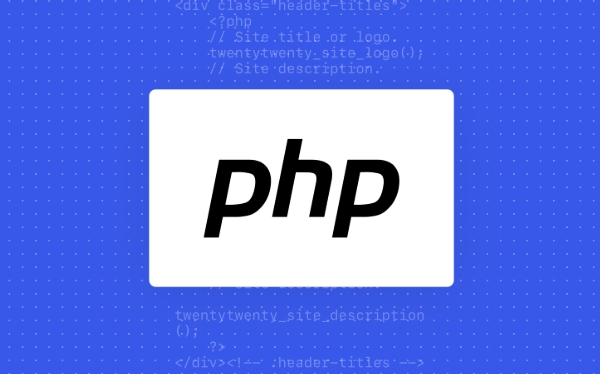The key steps to building a RESTful API with PHP are as follows: 1. Design a clear routing structure, which can be implemented by parsing URLs and HTTP methods or using frameworks (such as Slim, Lumen); 2. Use JSON as the data format and set the correct response status code (such as 200, 201, 400, 404, 500); 3. Strengthen data verification and security, use preprocessing statements to prevent SQL injection, and consider adding an identity authentication mechanism (such as JWT or API Key) to ensure that the interface is safe and reliable.

It is actually not difficult to build a RESTful API with PHP. As long as you understand the basic request processing process and structural design principles, you can quickly implement it. The core is to organize the routing, process HTTP methods, and return appropriate JSON format data.

Design a clear routing structure
PHP itself is a traditional scripting language, and does not have a powerful routing system built in like Node.js, but you can manually handle $_SERVER['REQUEST_URI'] or use lightweight frameworks such as Slim, Lumen to simplify routing management.

For example, if you have a /api/users interface, it must support GET, POST, PUT, and DELETE:
- GET /api/users → Get user list
- POST /api/users → Create a new user
- GET /api/users/1 → Get the user with ID 1
- PUT /api/users/1 → Update user information
- DELETE /api/users/1 → Delete user
You can decide which controller method to call by parsing the URL path and HTTP method.

Tips: If you don't want to introduce a framework, you can write a simple router yourself and judge the path and method based on
parse_url()andswitch.
Use appropriate data format and response status code
The most common data format for RESTful API is JSON. PHP provides json_encode() and json_decode() functions, which are very convenient to convert.
Also, remember to set the correct HTTP response status code, such as:
- 200 OK → Successfully obtained resources
- 201 Created → Successfully created resource
- 400 Bad Request → Request parameter error
- 404 Not Found → Resource not found
- 500 Internal Server Error → Server Internal Error
Before output, it is best to add a header:
header("Content-Type: application/json");This way the client knows how to parse your return content.
Data verification and security cannot be ignored
Many people only focus on functions when writing interfaces, ignoring input verification and security protection. for example:
- Are the fields submitted by the user empty?
- Is SQL injection filtering done?
- Are access frequency restricted?
For database operations, it is recommended to use PDO or MySQLi preprocessing statements to prevent injection attacks. For example:
$stmt = $pdo->prepare("INSERT INTO users (name, email) VALUES (?, ?)");
$stmt->execute([$name, $email]);In addition, consider adding authentication mechanisms (such as JWT or API Key), especially when it comes to sensitive data or user permissions.
Basically that's it. The key to writing a RESTful API in PHP is to have clear structure and clear logic, and it can be completed without too complex tools. Of course, if the project gets bigger, it is recommended to use a framework to improve efficiency and maintainability.
The above is the detailed content of How to build a RESTful API with PHP?. For more information, please follow other related articles on the PHP Chinese website!

Hot AI Tools

Undress AI Tool
Undress images for free

Undresser.AI Undress
AI-powered app for creating realistic nude photos

AI Clothes Remover
Online AI tool for removing clothes from photos.

Clothoff.io
AI clothes remover

Video Face Swap
Swap faces in any video effortlessly with our completely free AI face swap tool!

Hot Article

Hot Tools

Notepad++7.3.1
Easy-to-use and free code editor

SublimeText3 Chinese version
Chinese version, very easy to use

Zend Studio 13.0.1
Powerful PHP integrated development environment

Dreamweaver CS6
Visual web development tools

SublimeText3 Mac version
God-level code editing software (SublimeText3)

Hot Topics
 PHP Variable Scope Explained
Jul 17, 2025 am 04:16 AM
PHP Variable Scope Explained
Jul 17, 2025 am 04:16 AM
Common problems and solutions for PHP variable scope include: 1. The global variable cannot be accessed within the function, and it needs to be passed in using the global keyword or parameter; 2. The static variable is declared with static, and it is only initialized once and the value is maintained between multiple calls; 3. Hyperglobal variables such as $_GET and $_POST can be used directly in any scope, but you need to pay attention to safe filtering; 4. Anonymous functions need to introduce parent scope variables through the use keyword, and when modifying external variables, you need to pass a reference. Mastering these rules can help avoid errors and improve code stability.
 How to handle File Uploads securely in PHP?
Jul 08, 2025 am 02:37 AM
How to handle File Uploads securely in PHP?
Jul 08, 2025 am 02:37 AM
To safely handle PHP file uploads, you need to verify the source and type, control the file name and path, set server restrictions, and process media files twice. 1. Verify the upload source to prevent CSRF through token and detect the real MIME type through finfo_file using whitelist control; 2. Rename the file to a random string and determine the extension to store it in a non-Web directory according to the detection type; 3. PHP configuration limits the upload size and temporary directory Nginx/Apache prohibits access to the upload directory; 4. The GD library resaves the pictures to clear potential malicious data.
 Commenting Out Code in PHP
Jul 18, 2025 am 04:57 AM
Commenting Out Code in PHP
Jul 18, 2025 am 04:57 AM
There are three common methods for PHP comment code: 1. Use // or # to block one line of code, and it is recommended to use //; 2. Use /.../ to wrap code blocks with multiple lines, which cannot be nested but can be crossed; 3. Combination skills comments such as using /if(){}/ to control logic blocks, or to improve efficiency with editor shortcut keys, you should pay attention to closing symbols and avoid nesting when using them.
 How Do Generators Work in PHP?
Jul 11, 2025 am 03:12 AM
How Do Generators Work in PHP?
Jul 11, 2025 am 03:12 AM
AgeneratorinPHPisamemory-efficientwaytoiterateoverlargedatasetsbyyieldingvaluesoneatatimeinsteadofreturningthemallatonce.1.Generatorsusetheyieldkeywordtoproducevaluesondemand,reducingmemoryusage.2.Theyareusefulforhandlingbigloops,readinglargefiles,or
 Tips for Writing PHP Comments
Jul 18, 2025 am 04:51 AM
Tips for Writing PHP Comments
Jul 18, 2025 am 04:51 AM
The key to writing PHP comments is to clarify the purpose and specifications. Comments should explain "why" rather than "what was done", avoiding redundancy or too simplicity. 1. Use a unified format, such as docblock (/*/) for class and method descriptions to improve readability and tool compatibility; 2. Emphasize the reasons behind the logic, such as why JS jumps need to be output manually; 3. Add an overview description before complex code, describe the process in steps, and help understand the overall idea; 4. Use TODO and FIXME rationally to mark to-do items and problems to facilitate subsequent tracking and collaboration. Good annotations can reduce communication costs and improve code maintenance efficiency.
 Quick PHP Installation Tutorial
Jul 18, 2025 am 04:52 AM
Quick PHP Installation Tutorial
Jul 18, 2025 am 04:52 AM
ToinstallPHPquickly,useXAMPPonWindowsorHomebrewonmacOS.1.OnWindows,downloadandinstallXAMPP,selectcomponents,startApache,andplacefilesinhtdocs.2.Alternatively,manuallyinstallPHPfromphp.netandsetupaserverlikeApache.3.OnmacOS,installHomebrew,thenrun'bre
 How to access a character in a string by index in PHP
Jul 12, 2025 am 03:15 AM
How to access a character in a string by index in PHP
Jul 12, 2025 am 03:15 AM
In PHP, you can use square brackets or curly braces to obtain string specific index characters, but square brackets are recommended; the index starts from 0, and the access outside the range returns a null value and cannot be assigned a value; mb_substr is required to handle multi-byte characters. For example: $str="hello";echo$str[0]; output h; and Chinese characters such as mb_substr($str,1,1) need to obtain the correct result; in actual applications, the length of the string should be checked before looping, dynamic strings need to be verified for validity, and multilingual projects recommend using multi-byte security functions uniformly.
 Learning PHP: A Beginner's Guide
Jul 18, 2025 am 04:54 AM
Learning PHP: A Beginner's Guide
Jul 18, 2025 am 04:54 AM
TolearnPHPeffectively,startbysettingupalocalserverenvironmentusingtoolslikeXAMPPandacodeeditorlikeVSCode.1)InstallXAMPPforApache,MySQL,andPHP.2)Useacodeeditorforsyntaxsupport.3)TestyoursetupwithasimplePHPfile.Next,learnPHPbasicsincludingvariables,ech






